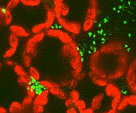Plant Pathology, Department of

Department of Plant Pathology: Faculty Publications
Document Type
Article
Date of this Version
9-1998
Citation
Yuen, G. Y., Xia, J. Q., and Sutula, C. L. 1998. A sensitive ELISA for Pythium ultimum using polyclonal and species-specific monoclonal antibodies. Plant Dis. 82:1029-1032.
Abstract
A double-antibody sandwich indirect enzyme-linked immunosorbent assay (ELISA) was developed for the detection and quantification of Pythium ultimum. A polyclonal antibody produced to cell walls of P. ultimum was used as the capture antibody, while a P. ultimum-specific monoclonal antibody (MAb E5) was used for recognition of the fungus. In the ELISA, culture extracts of 7 isolates of P. ultimum exhibited strong positive reactions, whereas none of the 37 isolates of other Pythium spp. and fungal genera had positive reactions. P. ultimum was detected by ELISA in roots of bean, cabbage, and sugar beet seedlings grown in pathogen-infested soil. ELISA optical density readings for infected bean and sugar beet root samples were highly correlated (r > 0.9) with infection levels determined by culturing the samples on water agar. The correlation between the two methods of testing cabbage roots was low, but all cabbage roots in which P. ultimum was detected by culturing were strongly positive in the ELISA. Samples of roots infected with P. irregulare and those with no Pythium infection did not react in the ELISA. The ELISA was highly sensitive; the fungus was detected in culture extracts diluted 1:5,000,000 and in roots with less than 1 infection per 100 cm root.


Comments
Copyright © 1998 The American Phytopathological Society. Used by permission.